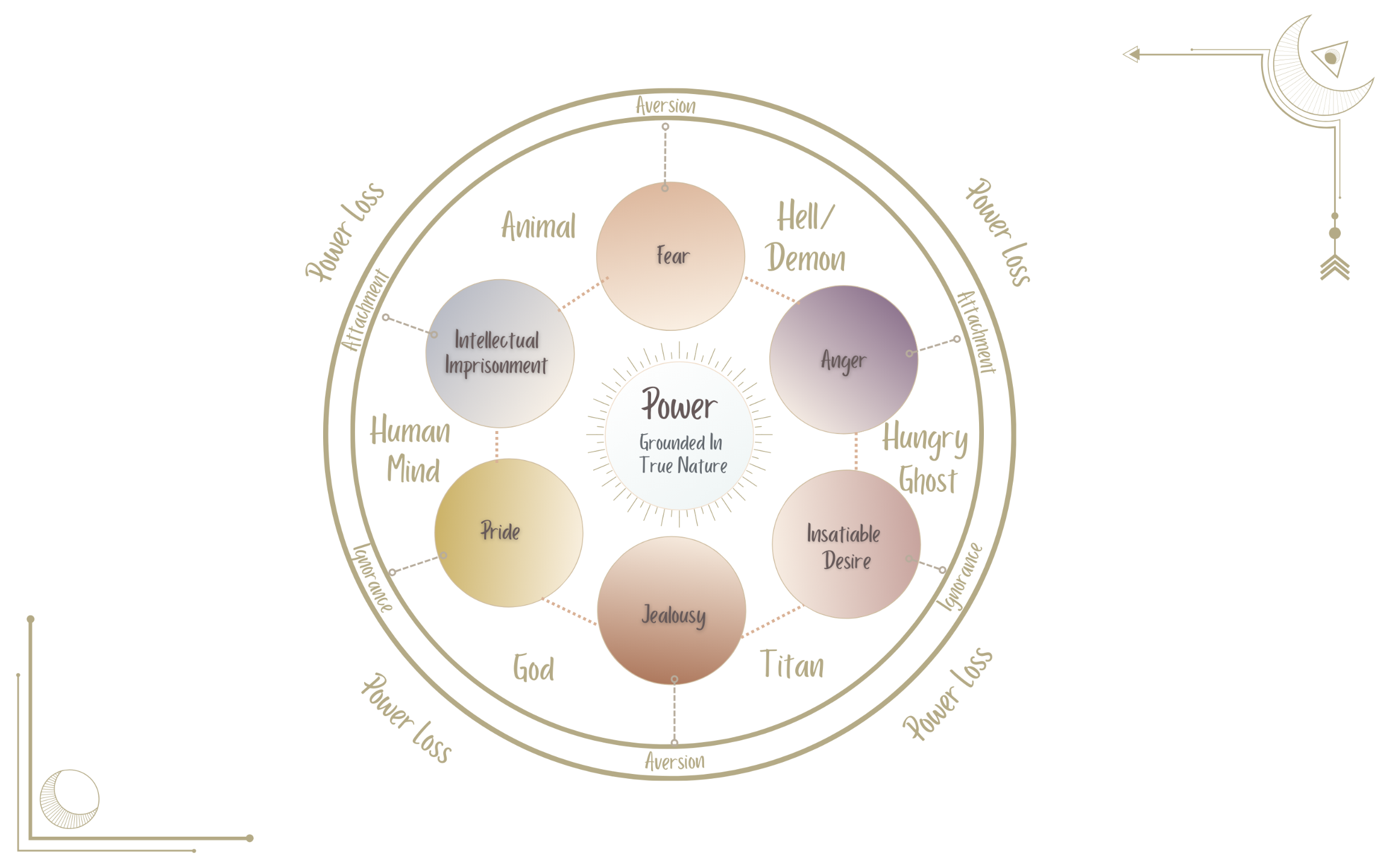
Your Results Indicate That Your Primary Karmic Pattern Is The Comfort Seeker.
This is also known as "Animal Realm" in Buddhist teachings.You love safety and familiarity, always opting for the cozy and secure path. While this keeps you snug and comfortable, it might also hold you back from exciting new adventures and growth. Let’s dive into what makes you tick.
What's Going On?
You might often feel fearful, numb, or compulsive, leading to a bit of self-neglect. Your primary need is to feel safe, which can drive you to seek comfort through addictions or familiar rituals. You’ve got those cozy habits down to a tee!
You tend to put up barriers of privacy, thinking, "This is mine, stay away." You might frequently tell yourself, "I'm fine like I am," "I don't need to change," or "It feels good to do it." Procrastination is your go-to, with thoughts like "I'll deal with it tomorrow."
Being vulnerable isn’t your favorite thing, and you might have a fear of intimacy, both with yourself and others. In your spiritual life, you might present a facade of being a faithful devotee but only engage in practices that feel good and are easy.
Here’s the tricky part: you desire contact and connection but only on your terms, which can push others away. Conversely, you want to be left alone, yet feel abandoned when you are. It’s a bit of a catch-22, right?
Wait a minute... does this sound like you? If you're thinking, "Noooo way, this isn't me," no worries! Sometimes these quizzes can miss the mark. Feel free to explore the other results and see if one of them fits you better. Check out the other karmic patterns by clicking the button below.
Let’s dive deeper into this karmic pattern and uncover how it shapes your life. Ready to explore? Let's go!
Check Out All The Karmic PatternsWant to Revisit Your Results? Be Sure To Bookmark This Page for Future Reference.
Safety In The Familiar
When life feels like a wild rollercoaster, you find comfort in the familiar. Just like animals patrol their territories and keep a watchful eye for intruders, you create routines, stick to known environments, and hang out with familiar faces to feel in control and safe. Your comfort zone is your cozy sanctuary, your happy place, providing you with a sense of security amidst the unpredictability of life.
Creating An Island of Isolation
Setting up boundaries can be a double-edged sword. On one side, it's your shield, protecting you from harm, disappointment, or betrayal. But here's the catch—every wall you build to keep danger out also keeps connection at bay. Over time, this can lead to feelings of loneliness and disconnection, making you feel like you're living on an isolated island. While your protective measures keep you safe, they can also leave you longing for deeper connections.
The Conflict of Connection
On one hand, the fear that drives you into isolation is often rooted in past experiences of being hurt by others, making you think that connections can be dangerous. But here's the twist—it's through genuine connection that healing, growth, and fulfillment often occur. So, there's this perpetual internal conflict: the yearning for deep connection versus the instinct to protect yourself from potential harm. It's like having an internal tug-of-war between wanting to open up and fearing the risks involved.
Vulnerability & Trust challenges
Feeling vulnerable often stems from a deep-rooted fear of not feeling safe. While animals worry about physical survival, humans take it to the next level with emotional and psychological fears. The threats might not always be tangible, but the fear is very real—fear of betrayal, rejection, loss of control, or emotional pain. This vulnerability makes trusting others a real challenge. If you see the world as a place full of hidden dangers, every new relationship feels like a potential risk. Trust starts to seem like a luxury you can't afford. This mindset can lead to constantly doubting others' intentions, being overly suspicious, or searching for signs of betrayal even when there aren’t any. It’s like being on high alert all the time, which can be exhausting and isolating.

Only On My Terms
The "on my terms only" attitude is a clever defense mechanism. It’s your way of keeping vulnerability at bay by maintaining control over relationship dynamics. If you can dictate the terms, you believe you can limit your exposure to harm. This might show up as setting rigid boundaries, avoiding deep emotional commitments, or always needing to maintain a dominant position in the relationship. It’s like having a personal rulebook to ensure you stay in the driver’s seat, but it can also keep genuine connection at arm’s length.
Emotional Armoring
Just like animals have physical defenses (like shells, horns, or camouflage) to protect against threats, when we play in the Animal Realm, we build emotional armor. This can take the form of indifference, aggression, sarcasm, or any behavior that keeps others at a distance and prevents true emotional intimacy. It’s like wearing a protective suit of armor that shields you from emotional harm but also keeps you from forming deep, meaningful connections with others.
The Pardox of Intimacy
True intimacy requires vulnerability. It’s about letting our guard down and allowing others to see all aspects of our persona, warts and all. For those stuck in the Animal Realm mentality, this kind of openness seems counterintuitive. You might crave deep connection, but the fear of vulnerability prevents you from allowing yourself to be seen, which is what’s required for true intimacy. It’s a bit of a paradox—you want to connect deeply but struggle to let down your defenses enough to make it happen.
Karmic patterns keep you in an endless loop of seeking and striving, always just out of reach of joy, love, and prosperity. These unseen forces shape your experiences in life, manifesting in your thoughts, emotions, and actions.
There Are 6 Karmic Patterns
that tend to emerge time and again...

These six karmic patterns keep you stuck in an endless pursuit of love, joy, and prosperity. By pinpointing how these karmic patterns play out in your life, you can harness the transformative principles and practices of non-dual Tantra to break free and start reclaiming your power. This journey is also known as awakening or spiritual emergence.
Meet The Six Karmic Patterns: Iconic Characters & Real Life Figures
Karmic Pattern 1 | Comfort Seeker (aka Animal Realm)
In the Animal Realm, you may often find yourself feeling fearful, numb, or compulsive, leading to self-neglect. Your primary need is to feel safe, which can drive you to seek comfort through addictions or familiar rituals. You tend to put up barriers of privacy, thinking "this is mine, stay away." You might frequently tell yourself, "I'm fine like I am," "I don't need to change," or "It feels good to do it." Procrastination is common, with thoughts like "I'll deal with it tomorrow." You find it uncomfortable to be vulnerable and may have a fear of intimacy, both with yourself and others. There’s a double bind in your interactions: you desire contact and connection but only on your terms, which can push others away. Conversely, you want to be left alone, yet feel abandoned when you are.
Examples:
Bilbo Baggins (The Hobbit):
Bilbo is the epitome of a comfort seeker. He loves the safety and predictability of his home in the Shire and is initially resistant to the idea of adventure. His journey begins only when he is pushed out of his comfort zone, illustrating the Animal Realm's attachment to safety and the fear of the unknown.
Marlin (Finding Nemo):
Marlin is incredibly protective and cautious, driven by a deep fear of losing his son. His need for safety and familiarity leads him to be overly cautious, avoiding risks at all costs. His journey to find Nemo forces him to confront these fears and step out of his comfort zone.
Ross Geller (Friends):
Ross frequently seeks comfort in familiar routines and relationships. His fear of change and desire for security often lead to procrastination and a reluctance to embrace new experiences. Ross's need for control and comfort is a hallmark of the Animal Realm.
Warren Buffett:
Known for his cautious and risk-averse investment strategies, Buffett prefers stable, long-term investments over speculative ventures. His approach to finance reflects a desire for safety and security, avoiding the unpredictable nature of high-risk investments. Buffett's comfort with familiar, steady growth exemplifies the Animal Realm's traits.
These examples highlight the characteristics of the Animal Realm, showing how the need for safety and familiarity can both protect and limit individuals, keeping them from experiencing the full breadth of life's adventures and opportunities.

Karmic Pattern 2 | Victim Of The Universe (aka Demon/Hell Realm)
In the Demon Realm, you might feel trapped in a victim mentality, with anger, bitterness, and frustration ruling your emotions. Constantly seeking reasons to validate your sense of victimhood, you might use guilt, shame, and blame to create a false sense of power. You may feel disrespected, asking, "Why me?" or "It’s not fair." In your spiritual life, you might adopt a self-righteous facade, critiquing spiritual teachers. You often feel you can't engage unless conditions are perfect, leading to excuses that prevent progress. The pervasive thought "I can't trust anyone" leads to emotional and physical isolation, even though you crave connection and intimacy.
Examples
Cersei Lannister (Game of Thrones):
Cersei's relentless pursuit of power and control often leaves her feeling isolated and paranoid. Her constant need to validate her victimhood and maintain control exemplifies the Demon Realm's struggle.
Darth Vader (Star Wars):
Driven by anger and a sense of betrayal, Darth Vader seeks to dominate and control, using fear and power to compensate for his feelings of inadequacy and loss.
Claire Underwood (House of Cards):
Claire's calculated and manipulative nature, combined with her ambition for power, often leaves her feeling disconnected and mistrustful of others. Her strategic control over her environment and relationships is a hallmark of the Demon Realm.
Rupert Murdoch:
Known for his influential control over media empires, Murdoch's relentless pursuit of power and dominance in the industry reflects the characteristics of the Demon Realm. His need for control and influence often overshadows genuine connections and trust in others.
These examples highlight the characteristics of the Demon Realm, illustrating how the need for control and validation of victimhood can lead to emotional isolation and a cycle of bitterness and frustration.
Learn More About Karmic Pattern 2
Karmic Pattern 3 | Unfulfilled Seeker (aka Hungry Ghost Realm)
In the Hungry Ghost Realm, you might find yourself driven by insatiable desire, desperateness, neediness, and longing. There is a constant feeling of "not enough" or "not good enough." You're always looking at what's missing, preoccupied with what you've lost or fantasizing about the future. This realm is marked by a deep-seated need to fill an inner void, often seeking external validation, approval, love, or recognition to feel complete. The double-bind here is that achieving these desires often leads to a fleeting sense of fulfillment, quickly replaced by the same feelings of emptiness.
Examples:
Jay Gatsby (The Great Gatsby):
Gatsby's relentless pursuit of wealth and status is driven by his desire to win back Daisy Buchanan. Despite his immense wealth, he is never satisfied, always feeling that something is missing in his life, which is a quintessential trait of the Hungry Ghost Realm.
Michael Scott (The Office):
Michael's constant need for validation and approval from his employees and peers often leads him to make questionable decisions. His longing to be loved and admired by everyone around him drives many of his actions, showcasing the Hungry Ghost Realm's desire for external affirmation.
Carrie Bradshaw (Sex and the City):
Carrie's quest for the perfect relationship and her obsession with material possessions often leave her feeling unfulfilled. Despite her successful career, she frequently feels that she isn't enough, continually seeking love and validation from her romantic partners and friends.
Howard Hughes:
Hughes' insatiable desire for success and recognition, combined with his eccentric behavior and relentless pursuit of more, exemplifies the Hungry Ghost Realm. Despite his vast wealth and achievements, he was never truly content, always striving for something more to fill the void.
These examples illustrate the characteristics of the Hungry Ghost Realm, highlighting how the constant pursuit of external validation and fulfillment can lead to a perpetual state of longing and dissatisfaction.
Learn More About Karmic Pattern 3
Karmic Pattern 4 | The Boot Strapper (aka Titan Realm)
In the Titan Realm, you might be driven by the energy of competition and the need to prove yourself to gain respect and feel loved. It's a world of "me versus you" and "us versus them," where fear of failure constantly looms, leaving you vulnerable to criticism and shame. You're always striving for greater accomplishments to prove your worth, embodying perfectionism, jealousy, and a sense of entitlement. The double bind here is that while you achieve significant milestones, the relentless drive for recognition and success can lead to burnout and a lack of genuine connection with others.
Examples:
Rocky Balboa (Rocky):
Rocky's relentless determination to overcome obstacles and prove himself in the boxing ring embodies the Titan Realm. His journey from an underdog to a champion showcases his drive to achieve respect and recognition through hard work and perseverance.
Tony Stark (Iron Man):
Tony Stark's genius and ambition drive him to continually outdo himself and others. His need to prove his worth and be the best in everything he does is a hallmark of the Titan Realm. Despite his success, he often struggles with the pressure to maintain his status and achievements.
Katniss Everdeen (The Hunger Games):
Katniss's fight for survival and her determination to protect her loved ones illustrate the Titan Realm's competitive spirit. Her drive to succeed against all odds, combined with her resourcefulness and resilience, highlights her boots trapper mentality.
Michael Jordan:
Jordan's intense competitiveness and relentless pursuit of excellence on the basketball court make him a prime example of the Titan Realm. His need to prove himself and be recognized as the best player of all time fueled his legendary career and numerous accomplishments.
These examples highlight the characteristics of the Titan Realm, illustrating how the need to prove oneself through competition and achievement can lead to impressive successes but also challenges in maintaining balance and genuine connections.
Learn More About Karmic Pattern 4
Karmic Pattern 5 | The Guru (aka God Realm)
In the God Realm, you might experience significant successes in life, bringing you material and sometimes even spiritual rewards. This comfort can make you lose track of reality, becoming preoccupied with feeling good and avoiding pain. You might surround yourself with people who inflate your sense of self-importance and believe that you can create a life of pleasure merely by willing it into existence. The downside is a sense of superiority and detachment from the real struggles of others. The double bind here is that while you may achieve a sense of grandeur, it often leads to isolation and a lack of genuine connection.
Examples
Walter White (Breaking Bad):
Walter's transformation from a humble chemistry teacher to a powerful drug lord illustrates the God Realm's traits. His success and sense of superiority grow, leading him to believe he is above the law and untouchable, ultimately isolating him from his loved ones.
Miranda Priestly (The Devil Wears Prada):
Miranda's immense success and authoritative position in the fashion industry make her a quintessential figure of the God Realm. Her belief in her own superiority and her demanding nature often isolate her from genuine connections, as she prioritizes success and control over personal relationships.
Don Draper (Mad Men):
Don's success in the advertising world and his belief in his own creative genius highlight the God Realm's characteristics. His sense of superiority and detachment from others' emotions often lead to personal turmoil and isolation, despite his professional achievements.
Elon Musk:
Musk's visionary ideas and significant achievements in technology and space exploration exemplify the God Realm. His belief in his own abilities and grand visions can sometimes lead to a sense of detachment from everyday concerns, creating a persona of invincibility and isolation from those who don't share his visionary mindset.
These examples illustrate the characteristics of the God Realm, showing how great success and a sense of superiority can lead to isolation and a disconnect from the reality and struggles of others.
Learn More About Karmic Pattern 5
Karmic Pattern 6 | The Intellect (aka Human Mind Realm)
In the Human Mind Realm, you might feel driven by the need to understand and make sense of everything around you. This desire for intellectual mastery can lead to overanalyzing and getting trapped in your thoughts. You might place more significance on concepts and ideas than on direct experience, often feeling that things will be better once you have them figured out. This realm values knowledge and understanding but can lead to a disconnection from emotions and the present moment. The double bind here is that while seeking clarity and certainty, you might miss out on the richness of life as it unfolds.
Examples:
Sheldon Cooper (The Big Bang Theory):
Sheldon's obsession with knowledge, routine, and his struggle with social interactions embody the Human Mind Realm. His need for intellectual dominance often leaves him disconnected from the emotional experiences of those around him.
Sherlock Holmes (Sherlock):
Holmes's exceptional analytical skills and his reliance on logic and reason over emotions perfectly illustrate the Human Mind Realm. His brilliance in solving mysteries often comes at the cost of personal relationships and emotional connection.
Spencer Reid (Criminal Minds):
Reid's profound intelligence and his tendency to analyze every situation reflect the Human Mind Realm. His intellectual pursuits and eidetic memory often leave him feeling isolated and struggling with personal interactions.
Rachel Maddow:
Known for her sharp intellect and analytical approach as a political commentator, Maddow embodies the Human Mind Realm. Her deep dive into details and reliance on facts and analysis highlight her need for intellectual mastery, sometimes at the expense of emotional engagement.
These examples highlight the characteristics of the Human Mind Realm, showcasing how the pursuit of knowledge and understanding can lead to a sense of intellectual imprisonment, disconnecting individuals from the emotional and experiential aspects of life.
Learn More About Karmic Pattern 6
This Is Just The Beginning
What you’ve seen here is just the tip of the iceberg, a glimpse into the intricate world of karmic patterns. Each of these realms is a rich tapestry of behaviors, emotions, and experiences that go far beyond what a few paragraphs can capture. Understanding these patterns in depth and clearing them can profoundly transform your life, leading to greater joy, love, and prosperity.
Ready To Unlock Your Path to Lasting Joy, Love & Prosperity?
Across all Eastern-Spiritual Traditions there's a consensus-- the key to unlocking your spiritual potential lies in clearing your karmic patterns. Luckily, they've passed down precise teachings and practices to help you navigate this path.
Your Next Step...
Guiding you through this transformative journey is what I do best, and I offer two powerful options to help you break free from your karmic patterns.
Living & Leading With The Wisdom Of Oneness (Self-Paced Course)
Dive deep into the powerful teachings of non-dual Tantra and unlock the secrets to breaking free from the six karmic patterns. Get ready to live an AWAKENED life bursting with unshakable freedom and fulfillment in this 8-module self-paced course. You'll learn how to navigate and neutralize each of the 6 karmic patterns paving the way for lasting love, joy and prosperity!
Explore NowThe Embodied Awakening Process- Personalized Guidance
Ever feel like there’s more to life, but it always seems just out of reach? Discover the path to lasting freedom and fulfillment with this transformative, six-session process designed to explore and resolve the recurring karmic patterns in your life. This comprehensive process goes beyond conventional therapy or life coaching by diving into your karmic patterns—those cycles that keep you stuck repeating the same lessons despite previous efforts to change. *Includes access to the Living & Leading With The Wisdom of Oneness self-paced course.
Explore NowHey There! I'm Lisa,
a professionally trained psycho-spiritual counselor and meditation teacher with a knack for guiding folks through spiritual emergence (aka awakening) and spiritual emergencies.
Foundational to my work is identifying and clearing karmic patterns through a unique blend of Yoga and Buddhist psychology, Non-Dual Tantric practices, and somatic (embodied) healing. I've been walking this wild path myself for over two-decades and now have a thriving practice helping others do the same. I teach and work with clients both in person and online in the vibrant San Francisco Bay Area.
On the personal side, I’ve been with my husband for 14 wonderful years, and we've been married for 7 of those. I have an adult daughter, two mischievous cats, and a slightly neurotic, but very lovable labradoodle. I call West Sonoma County my home, and when I’m not meditating, you’ll probably find me pedaling my bike through the breathtaking redwoods of the Bohemian Highway or the scenic vineyards of Russian River Valley, soaking in the beauty of this magical place.


